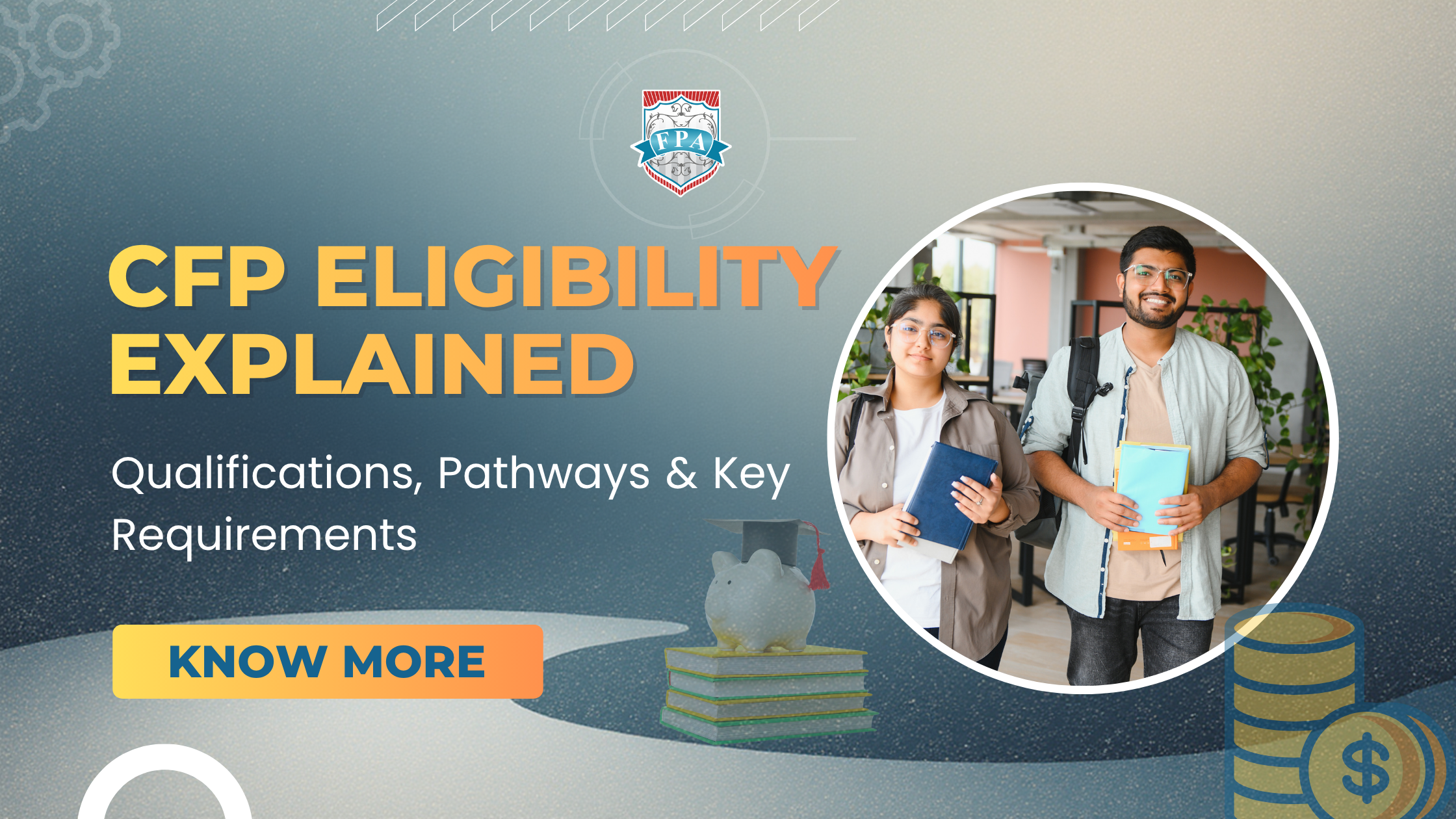If you’re passionate about personal finance, love helping people make wiser money decisions, and dream of building a respected career in financial planning, then becoming a Certified Financial Planner (CFP) could be your perfect path. But before you begin, it’s important to clearly understand the CFP Eligibility, the pathways available, and the academic or professional criteria you must meet.
This guide breaks down the certified financial planner eligibility requirements in a simple, structured, and easy-to-understand way so you can confidently plan your journey.
Why CFP Is a Career Worth Considering?
The demand for qualified financial planners is growing rapidly. Rising incomes, complex investment options, tax planning needs, and retirement concerns have made expert financial guidance essential. As a CFP professional, you stand out with global recognition, credibility, and the ability to build a successful and rewarding consulting practice.
But your journey starts with understanding the CFP eligibility criteria.
CFP Eligibility: Who Can Apply?
The Financial Planning Standards Board (FPSB) — the global body that manages the CFP certification — has set clear requirements to ensure that certified professionals maintain high ethical, academic, and professional standards.
Here are the essentials:
- Educational Qualifications
To meet the CFP eligibility criteria, you must have:
- A bachelor’s degree (any stream) from a recognized university — this degree must be completed before earning your CFP certification, but you can start the course earlier.
- Completion of FPSB’s education modules, which include key topics like:
- Investment Planning
- Retirement & Tax Planning
- Risk & Insurance Planning
- Estate Planning
- Financial Plan Construction
Even if you’re not from a finance background, you can still apply — making certified financial planner eligibility flexible and open to all passionate learners.
Multiple Pathways to Qualify for CFP
One of the strengths of the CFP program is that it accommodates learners from different backgrounds. FPSB offers two main pathways:
- Regular Pathway
This pathway is ideal for:
- Students
- Fresh graduates
- Working professionals with limited finance experience
What you need to do:
- Enroll in the CFP education program
- Complete all modules and exams step-by-step
- Gain the required financial planning knowledge
- Complete 1–3 years of professional experience (depending on your job role)
The CFP Eligibility under the regular route is simple and suitable for most applicants.
- Challenge Pathway
This pathway is for experienced professionals or candidates with a strong academic background in finance.
You can choose this route if you have:
- CA, CFA, ICWA, CS qualifications
- MBA in Finance
- Other recognized professional certifications related to finance and investments
Under the Challenge Pathway, you are exempted from most education modules and can directly attempt the final exam — making the process faster.
If you meet the certified financial planner eligibility through this route, you can complete the CFP journey in a shorter time.
Work Experience Requirements
Besides the academic requirements, real-world experience is crucial for becoming a CFP.
You need:
- 6,000 hours (approx. 3 years) of relevant professional experience
OR - 4,000 hours (approx. 2 years) of supervised apprenticeship experience under a qualified financial planning professional
Your work must be related to financial advisory, investment planning, wealth management, insurance planning, or similar fields.
This ensures CFPs enter the industry with practical knowledge and ethical practices.
Key Skills You Should Bring Along
While the CFP eligibility criteria focus on academic and professional qualifications, successful financial planners also possess:
- Strong analytical abilities
- Communication and interpersonal skills
- Interest in personal finance
- Ethical decision-making
- Problem-solving mindset
A combination of these skills and the CFP certification can create a powerful career foundation.
CFP Exam Requirements
To become a Certified Financial Planner, you must clear the CFP exam conducted by FPSB, which assesses your expertise across:
- Financial concepts
- Client handling
- Case-based problem solving
- Comprehensive financial plan creation
The exam validates your readiness to work as a qualified financial planner.
Why Meeting CFP Eligibility Matters?
The certification is globally recognized across more than 25 countries. Meeting the certified financial planner eligibility ensures that every CFP professional carries:
- High ethical standards
- In-depth financial knowledge
- Practical industry experience
- Trust and recognition among clients
It sets you apart from regular financial advisors and builds long-term career credibility.
Final Thoughts
Becoming a CFP is not just about earning a certification — it’s about building a fulfilling career where you genuinely impact people’s lives. And it all begins with understanding the CFP eligibility pathways and ensuring you meet the educational and professional criteria.
Whether you’re a student, a working professional, or an experienced finance specialist, there’s a pathway that fits your background. With proper planning, guidance, and dedication, achieving the CFP designation becomes a rewarding and achievable goal.
Take the first step today. Your future as a trusted financial planning expert awaits!





